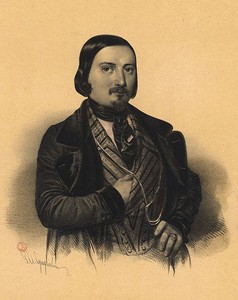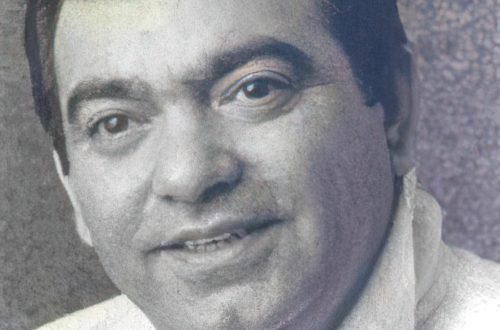
Enrico Tamberlik (Enrico Tamberlik) |
Enrico Tamberlik

Tamberlik is one of the greatest Italian singers of the 16th century. He had a voice of beautiful, warm timbre, of extraordinary power, with a brilliant upper register (he took a high chest cis). Enrico Tamberlic was born on March 1820, XNUMX in Rome. He began to study singing in Rome, with K. Zerilli. Later, Enrico continued to improve with G. Guglielmi in Naples, and then honed his skills with P. de Abella.
In 1837, Tamberlic made his debut in a concert in Rome – in a quartet from the opera “Puritanes” by Bellini, on the stage of the theater “Argentina”. The following year, Enrico took part in the performances of the Rome Philharmonic Academy at the Apollo Theater, where he performed in William Tell (Rossini) and Lucrezia Borgia (Donizetti).
Tamberlik made his professional debut in 1841. At the Neapolitan theater “Del Fondo” under the name of his mother Danieli, he sang in Bellini’s opera “Montagues and Capulets”. There, in Naples, in the years 1841-1844, he continued his career at the theater “San Carlo”. Since 1845, Tamberlik began to tour abroad. His performances in Madrid, Barcelona, London (Covent Garden), Buenos Aires, Paris (Italian Opera), in the cities of Portugal and the USA are held with great success.
In 1850, Tamberlik sang for the first time at the Italian Opera in St. Petersburg. Leaving in 1856, the singer returned to Russia three years later and continued to perform until 1864. Tamberlik also came to Russia later, but he sang only in concerts.
A.A. Gozenpud writes: “An outstanding singer, a talented actor, he possessed the gift of an irresistible impact on the audience. Many appreciated, however, not the talent of a remarkable artist, but his upper notes – especially amazing in strength and energy “C-sharp” of the upper octave; some specially came to the theater in order to hear how he takes his famous at. But along with such “connoisseurs” there were listeners who admired the depth and drama of his performance. The passionate, electrifying power of Tamberlik’s art in heroic parts was determined by the civic position of the artist.
According to Cui, “when in William Tell … he energetically exclaimed“ cercar la liberta ”, the audience always forced him to repeat this phrase – an innocent manifestation of the liberalism of the 60s.”
Tamberlik already belonged to the new performing wave. He was an outstanding interpreter of Verdi. However, with the same success he sang in the operas of Rossini and Bellini, although fans of the old school found that he overdramatized the lyrical parts. In Rossini’s operas, along with Arnold, Tamberlik won the highest victory in the most difficult part of Othello. According to the general opinion, as a singer he caught up with Rubini in it, and as an actor surpassed him.
In Rostislav’s review, we read: “Othello is Tamberlik’s best role… In other roles, he has wonderful glimpses, captivating moments, but here every step, every movement, every sound is strictly considered and even some effects are sacrificed in favor of the general artistic whole. Garcia and Donzelli (we do not mention Rubini, who sang this part excellently, but played very badly) portrayed Otello as some kind of medieval paladin, with chivalrous manners, until the moment of catastrophe, during which Othello suddenly transformed into a bloodthirsty beast … Tamberlik understood the nature of the role in a completely different way: he portrayed a half-wild Moor, accidentally put at the head of the Venetian army, exacted by honors, but who completely retained the distrust, secrecy and unbridled severity characteristic of the people of his tribe. Considerable considerations were required in order to preserve a decent dignity for the Moor, exalted by circumstances, and at the same time show shades of a primitive, rude nature. This is the task or goal to which Tamberlik strove until the moment when Othello, deceived by the cunning slander of Iago, casts off the guise of Eastern dignity and indulges in all the ardor of unbridled, wild passion. The famous exclamation: si dopo lei toro! that is precisely why it shocks the listeners to the depths of the soul, that it breaks out of the chest like a cry of a wounded heart … We are convinced that the main reason for the impression he makes in this role comes precisely from a clever understanding and skillful portrayal of the character of Shakespeare’s hero.
In Tamberlik’s interpretation, the greatest impression was made not by lyrical or love scenes, but by invocative heroic, pathetic ones. Obviously, he did not belong to the singers of an aristocratic warehouse.
The Russian composer and music critic A.N. Serov, who could not be attributed to the number of admirers of Tamberlik’s talent. Which, however, does not prevent him (perhaps against his will) from noting the merits of the Italian singer. Here are excerpts from his review of Meyerbeer’s Guelphs and Ghibellines at the Bolshoi Theatre. Here Tamberlik performs the role of Raul, which, according to Serov, does not suit him at all: “Mr. Tamberlik in the first act (combining the 1st and 2nd acts of the original score) seemed to be out of place. The romance with viola accompaniment passed colorlessly. In the scene where Nevers’s guests look out the window to see which lady came to see Nevers, Mr. Tamberlik did not pay sufficient attention to the fact that Meyerbeer’s operas require constant dramatic performance even in those scenes where nothing is given to the voice. except for short, fragmentary remarks. A performer who does not enter into the position of the person he represents, who, in the Italian manner, waits only for his aria or a big solo in morceaux densemble, is far from the requirements of Meyerbeer’s music. The same flaw came out sharply in the final scene of the act. The break with Valentina in front of her father, in the presence of the princess and the whole court, cannot but cause the strongest excitement, all the pathos of offended love in Raul, and Mr. Tamberlik remained as if an outside witness to everything that happened around him.
In the second act (the third act of the original) in the famous male septet, Raoul’s part shines with an extremely effective exclamation on very high notes. To such exclamations, Mr. Tamberlik was a hero and, of course, inspired the entire audience. They immediately demanded a repetition of this separate effect, despite its inseparable connection with the rest, despite the dramatic course of the scene …
… The big duet with Valentina was also performed by Mr. Tamberlik with enthusiasm and passed brilliantly, only the constant hesitation, swaying sound in Mr. Tamberlik’s voice hardly corresponds to Meyerbeer’s intentions. From this manner of our tenore di forza constantly trembling in his voice, places happen where absolutely all the melodic notes written by the composer merge into some kind of general, indefinite sound.
… In the quintet of the first act, the hero of the play appears on the stage – the ataman of the Fra Diavolo band of robbers under the guise of the dapper Marquis San Marco. One can only feel sorry for Mr. Tamberlik in this role. Our Othello does not know, poor fellow, how to cope with a part written in a register impossible for an Italian singer.
… Fra Diavolo is referred to the roles of playing tenors (spiel-tenor). Mr. Tamberlik, as an Italian virtuoso, belongs rather to non-playing tenors, and since the vocal side of his part in this piece is very inconvenient for him, he definitely has nowhere to express himself here.
But such roles as Raul are still an exception. Tamberlik was distinguished by the perfection of vocal technique, deep dramatic expressiveness. Even in his declining years, when the destructive influence of time affected his voice, sparing only the tops, Tamberlik amazed with the penetration of his performance. Among his best roles are Otello in Rossini’s opera of the same name, Arnold in William Tell, the Duke in Rigoletto, John in The Prophet, Raul in The Huguenots, Masaniello in The Mute of Portici, Manrico in Il trovatore, Ernani in Verdi’s opera of the same name, Faust.
Tamberlik was a man of progressive political views. While in Madrid in 1868, he welcomed the revolution that had begun and, risking his life, performed the Marseillaise in the presence of the monarchists. After a tour of Spain in 1881-1882, the singer left the stage.
W. Chechott wrote in 1884: “More than ever, and anyone, Tamberlik now sang with his soul, and not just with his voice. It is his soul that vibrates in every sound, makes the hearts of the listeners tremble, penetrates into their souls with each of his phrases.
Tamberlic died on March 13, 1889 in Paris.





